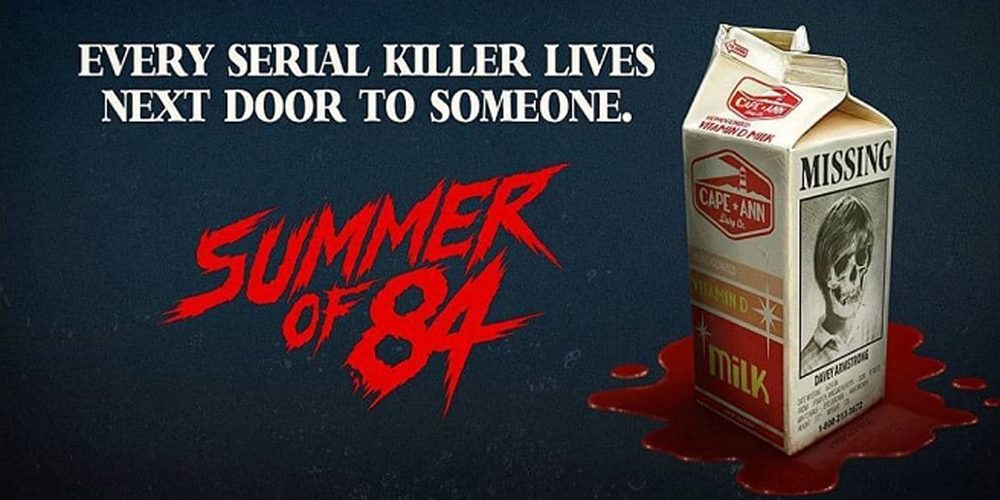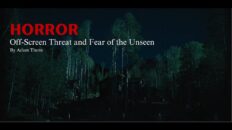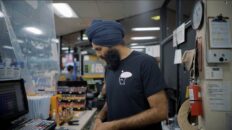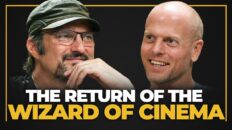Also, you can read Blake’s wide-ranging and informative interview with the screenwriters here on Rise Up Daily.
Darryl: I think the first thing that jumps out to you about Summer of 84 is its similarities to Netflix’s Stranger Things or last year’s IT. Another comparison might be J.J. Abrams’ Super 8. It’s not a genre per se, but they’re all of a type in referencing and sometimes recreating touchstones of 80s film and pop culture. One of the things that a lot of these works fail to do is move beyond homage. They’re great at tapping into nostalgia, and giving a modern polish to tropes that those of us of a certain age grew up acclimated to. But they’re not always great at taking those elements they’ve drawn from and recontextualizing them with anything new to say. I think Summer of 84 does that in a couple distinct ways. The first is set up right from the opening voice over–which sets up the film in a familiar trajectory with a sort of call to adventure or call to mystery–but then we view it in a very different way when it is repeated in reverse later in the film. In other words, I think it successfully says something on it’s own, outside of just creating a sense of nostalgia, that makes us reinterpret what we find familiar at the beginning. But I’d love to hear your thoughts on that.
Blake: It’s funny you drew the distinction between the voice over at the beginning and end of the film. I knew they were meant to be parallel in structure, but I didn’t recognize that they were identical, just in reverse order. That makes me appreciate the voice overs even more than I already did.
The reason why the bar was set so high from the beginning of the film for me was due to the content of that opening narration. It got at what 80s horror always implied, but never said outright: the monster lives next door. Stephen King was exceptional at giving the sense that something was in the town’s water, something menacing, and all of the inhabitants were drinking of it. Most nostalgia trips like Stranger Things and IT trod the same ground, but largely stay on the surface. Things really are as they seem in the suburb or the town, it just so happens to be invaded by something outside.
Whereas Summer of 84 digs into the ideals of 80s life–when the country seemed to be in a boom financially–and finds that the roots underneath are rotten. Domestic abuse, drugs, and oppression were still present–in some cases significantly worse than they were prior to the decade. Not to mention the serial killer that may be down the block. This film says something deeper, because it contextualizes its central threat within the relational threats of everyday American life.
Darryl: I think a lot of films from the 80s were actually structured as critiques of the culture, but rarely stated that criticism in plain language. If you look at a film like To Live and Die in L.A., there’s this deep cut against the 80s macho, action hero character and the ends they come to. But it’s shown, not told. It even shows how despite those ends, the next generation keeps buying into that macho story. In the same way, a lot of 80s horror films did this to the idea of the picture-perfect suburb. There’s a lot going on under the surface, under the polished, but thin, veneer that is corrupt and decaying. And it’s often not seen by the adults who have bought into the idea of perfect little communities.
Summer of 84 is a little more direct in its critique of these neighborhoods. It comes closer to making the subtext that existed in 80s films like A Nightmare on Elm Street or Night of the Comet or Gremlins text. I think some viewers will take an issue with that, wanting the film’s commentary to be more subtle, more opaque. But that’s part of what makes it a different way of approaching the material, not just a nostalgia vehicle. I’m not sure if it offers much in the way of moving forward, but I think it more forcefully asks us to look harder in the mirror.
Blake: 80s culture in general is full of nuanced critique wrapped in upbeat and glossy packaging. Look at the synth-heavy pop music of the day that was so often danceable and upbeat; but dig deeper into the lyrics and they often told another story, one that belied the safety and financial security of the West during the decade. Horror films in 80s are often tied to Judeo-Christian moral codes and their slashers or monsters were usually the long-arm of the Law, striking those who transgressed, whether it was premarital sex or revenge for a wrong done to the being in the past–like Jason Voorhees’ bullying and eventual death.
However, the subtext of those films avoids something that I think Summer of 84 directly tackles, but not in a heavy-handed way. I find myself thinking back to David Fincher’s 2007 film, Zodiac, when it begins to show the potential for the everyday cruelty and psychosis of people who turn out to not be the Zodiac killer. When a man loosens the tire of a young woman’s car and then offers her and her baby a ride when it blows out–only to threaten to kill her and throw the baby out the window–we see another, separate, threat which the Zodiac only takes credit for.
Similarly, Summer of 84 begins to erode the idea of nostalgia through the slow revelation of the broken elements of each character’s life–whether it is Eats’ abusive home or Nikki’s anxiety around her parents’ divorce. While the serial killer’s prowl may be a more immediate life or death threat, these other elements–if the kids navigate through it without dying themselves–end up being arguably more intrusive and long-lasting in their negative effects than dying would. Part of me thinks that the film wants us to see that it’s the slow decay and death of fake suburban facades that might make becoming the victim of a serial killer preferable.
Darryl: The reading of characters like Jason Voorhees or Freddy Krueger as agents of moral justice was, I think, the most popular interpretation of a certain type of horror film for a long time. But I think that analysis has begun to be replaced in recent years by the idea that they are physical manifestation–walking metaphors, if you will–of the hidden evil in all of us. Of course, being works of art (yes, genre films are art), I think there’s plenty of room for both ways of looking at these characters.
But as you say, the idea that the slow decay of suburban facades might make becoming the victim of a serial killer preferable to living to become complicit in the construction of the next generation of the facade. At least, that’s one way to come through the other side of the realization that there is a darkness in us all. I think another way to engage that realization is seen, again by the voiceover bookends here. At the beginning of the film it’s almost a glib platitude. At the end it speaks to lived experience and a kind of communal, if not personal introspection. And then we have a choice: look away and construct another facade or do the hard work of living with that knowledge and confronting ourselves and our communities and the demons that lurk within.
Blake: I couldn’t agree more with that final word from you. I think, especially, in this day and age, that question of how we are complicit in social ills is an important one and how we choose to move forward and how we teach our youth to live life in a decaying world is perhaps the only way change can come about.
Now, as a horror guy, I found the scene at the end where Dale’s throat is slit by the serial killer to be quite visceral and blunt. Film has always had an uneasy relationship with the death of kids on screen. That taboo is slowly being broken down and we, as a culture, are beginning to be desensitized to it. Depending on how you shape your understanding of media, this could be a bad development or merely an indifferent one. I think the fact that Summer of 84 explicitly shows the death, and the almost sexual satisfaction the killer gets from it, that makes the film stand out from recent examples of kids’ deaths in film. I found it to be an unpleasant, but very grounded, moment in the film. If this scenario happened in real life–a neighborhood kid sniffs out a serial killer with his friends in tow–this is the ending I could foresee in real life. This and the killer’s monologue (along with the voice-overs) are what made this movie at the top of my horror picks for 2018.








